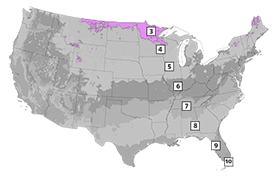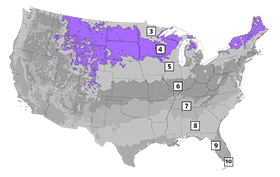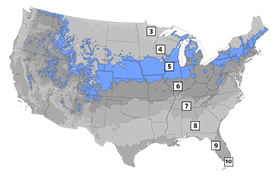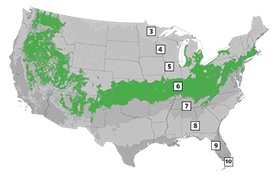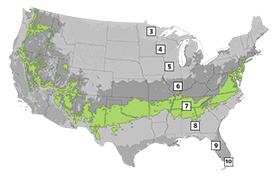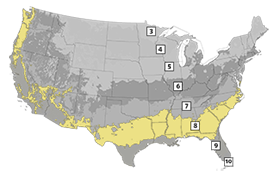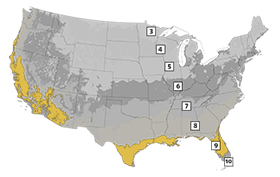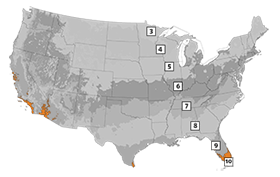-
Spring Planting
Order now for best selections.
-
Fall Planting
Available for preorder for fall 2025 delivery.
-
Bulk Flower Bulbs
Big savings on bulk orders!
- New
-
Gardening Resources
Flower Bulbs & Perennials at Wholesale Prices
Using the Hardiness Zone Map
We want you to get the best results from what you select. That is why we have provided this Hardiness Zone Map. The Hardiness Zones are based on the average minimum temperatures for each zone. Many factors, such as sun, wind, snow cover or rainfall in your mini climate can also affect the minimum temperatures in your area as presented by this map.
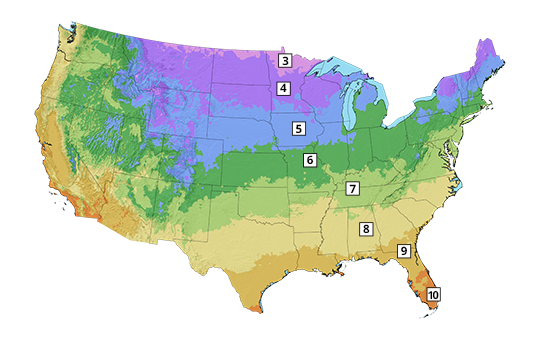
Color |
No. |
Shop for Plants by Your Garden Zone at K. van Bourgondien:
What is My Planting Zone?
Check the map to determine which hardiness zone you live in or click on the "Find Zone" button to find your zone. Simply enter your zip code and get information on your planting zone. Remember that zone maps cannot account for deviations in typical zones such as micro-climates or if your location is associated with unusual conditions for the region. Always remember that growing zone maps are not perfect and that elements like soil, moisture, humidity, heat, or other weather conditions at the time can influence how well your plants will grow in any US growing zone.If you really want a good look at your area, then the USDA Plant Hardiness Zone Map is also a good resource.
If you have a question, either call our Customer Service line, or consult your local County Agricultural Agent.
What Are Planting or Growing Zones?
In the United States, planting zones are specific locations that correspond to which plants can grow well there. The planting zone map is based on the average annual minimum winter temperature, and which varieties of flowers and plants can survive and thrive in those conditions. Zones are based on the average low temperatures that each area of the country has in winter. Meteorologists have arrived at this figure by averaging the temperatures over a 15-year period for each different region of the country.Which Growing Zone Will a Plant Thrive In?
Plant hardiness is very important to growing success. What exactly does it mean when a plant is hardy to your zone? What this is telling you is how much cold the plant can withstand without freezing to death. You'll find zone designations on every product page on this site and in the print catalog. A variety marked "Zones 3-8," for example, should grow and thrive in zones 3, 4, 5, 6, 7 and 8.Ship Date/Hardiness Zone
| Zone | Lowest Avg. Winter Temperature | Spring Catalog Shipping Begins | Fall Catalog Shipping Begins | ||
| Zone 3 | -40° to -30° F | Early May | Early September | ||
| Zone 4 | -30° to -20° F | Early May | Early September | ||
| Zone 5 | -20° to -10° F | Late March to Mid-April | Early September | ||
| Zone 6 | -10° to 0° F | Late February - Mid March | Early September | ||
| Zone 7 | 0° to 10° F | Late February | Mid-September | ||
| Zone 8 | 10° to 20° F | Mid-February | Mid-September | ||
| Zone 9 | 20° to 30° F | Early February | Mid-September | ||
| Zone 10 | 30° to 40° F | Early February | Mid-September | ||
Have another question? Return to the Customer Service Help page or send an e-mail directly to Customer Service
Copyright © 2025 Gardens Alive!, Inc. d/b/a Dutchbulbs.com. All Rights Reserved. Dutchbulbs.com trademarks are registered trademarks of Gardens Alive!, Inc.
This site is protected by reCAPTCHA and Google Privacy Policy and Terms apply.
This site is protected by reCAPTCHA and Google Privacy Policy and Terms apply.

Item added to cart


